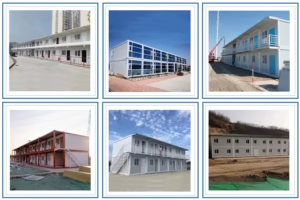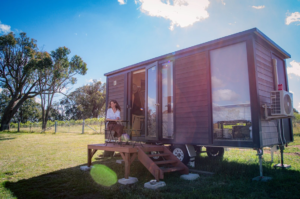The relatively new concept called prefabricated homes, or homes made up of modular sections, are well-known for being economical. Because of the controversy surrounding the construction industry, these types of homes gained fame and were widely sought after due to their numerous advantages such as dwelling cost, time-efficient construction period, and plethora of benefits that makes them a good alternative to traditional homes made at the construction site. Although many people seem captivated by these profits, direct owners of prefab homes seem to not be fully satisfied and present a critical question – is it better to purchase an economically friendly set model, or is it reasonable to acquire a set quality prefab model?
What unjustly sets that fiberglass home apart from more economically priced models? And is it accurate to say a premium priced prefab is cheap in comparison to its rivals? Let’s elaborate further on the answers.
1. Materials Matter: The Foundation of Durability & Comfort
The material quality determines how a prefabricated house is built, and its effectiveness, appeal, and durability.
Cheap Prefab Homes:
Manufacturers of low-cost homes often resort to using low-grade materials in order to save money. Thin wall panels, sub-par insulation, and flimsy exterior finishes are commonplace. While these homes might serve a purpose, they often lack the strength, energy efficiency, and aesthetic appeal.
Quality Prefab Homes:
Superior quality prefab homes have refined grade materials like reinforced structural components, superior insulation, and resilient exterior finishes of galvanized steel, composite panels, or top-tier timber. Such materials add to the prefab’s life, thermal efficiency, and weather resistance, making the residence more comfortable and low-maintenance.
2. Design & Customization: Tailoring Your Dream Home
Not all prefab homes are created equal when it comes to design flexibility.
Cheap Prefab Homes:
Most budget-friendly models come with constrained customization options, set floor plan layouts, and bare bone finishes. They often trying to giving you a ‘custom’ home but only with design features that do not match your lifestyle or aesthetic.
Quality Prefab Homes:
On the other hand, higher end model homes have looser guidelines when it comes to their customizations offered. These homes allow a an individual to customize the floor plan and finishing features as they so wish. If an individual wants his or her living area to be spacious, with open area and high ceilings, and custom-built cabinets, then there is no denying they will get a clear depiction of premium cabinetry options.
3. Energy Efficiency: Lower Bills, Greater Comfort
Less spending for a home does not guarantee long term economic betterment especially when considering operational costs, for example, energy expenditure.
Cheap Prefab Homes:
These homes often skimp on insulation, use single-pane windows, and rely on outdated HVAC systems. As a result, they may struggle to maintain stable indoor temperatures, leading to higher heating and cooling costs over time.
Quality Prefab Homes:
Designed with sustainability in mind, premium prefab homes incorporate advanced insulation, double- or triple-glazed windows, and energy-efficient HVAC systems. These features minimize energy waste, reduce utility bills, and create a more comfortable living environment year-round.
4. Construction Time: Speed vs. Precision
While prefab homes are generally faster to build than traditional houses, the level of craftsmanship can impact timelines.
Cheap Prefab Homes:
Lower-cost models may be rushed through production, increasing the risk of errors or installation issues. While they can still be assembled quickly, the final result might lack the polish and structural integrity of a more carefully built home.
Quality Prefab Homes:
Though they may take slightly longer to complete, high-end prefab homes undergo stringent quality control checks at every stage. The extra attention ensures a seamless installation, superior craftsmanship, and a home that’s built to last.
5. Durability & Longevity: Built to Stand the Test of Time
A home is a long-term investment—will yours hold up over the years?
Cheap Prefab Homes:
With inferior materials and construction methods, budget-friendly models may show wear and tear sooner. Issues like leaks, drafts, or structural weaknesses can arise within just a few years, leading to costly repairs.
Quality Prefab Homes:
Premium construction techniques and robust materials mean these homes are engineered for durability. They resist weathering, require less maintenance, and remain structurally sound for decades, offering peace of mind and long-term savings.
6. Resale Value: Protecting Your Investment
Thinking about the future? A home’s resale potential is a crucial factor.
Cheap Prefab Homes:
Due to their lower build quality, these homes often depreciate faster. Potential buyers may be wary of hidden issues, making them harder to sell at a good price.
Quality Prefab Homes:
A well-constructed prefab home retains its value much better. Buyers recognize the benefits of superior materials and craftsmanship, making it easier to sell—and possibly even profit—down the line.
7. Cost-Effectiveness: Balancing Budget & Benefits
At first glance, a cheap prefab home seems like the smarter financial choice. But is it really?
- Short-Term Savings: A budget model may be appealing if you need an affordable, no-frills solution.
- Long-Term Value: A quality prefab home, while pricier upfront, pays off in lower utility bills, minimal maintenance, and higher resale value.
Conclusion: Which Option Suits Your Needs?
The decision between a cheap and a high-quality prefab home ultimately depends on your priorities:
- Choose a budget model if you need an economical, short-term housing solution and don’t mind compromising on durability and customization.
- Invest in a premium prefab home if you want a durable, energy-efficient, and beautifully designed living space that will serve you well for years to come.
Remember: With prefab homes, you get what you pay for. While a cheap option may save money now, a quality home is an investment in comfort, sustainability, and future financial security. So, before making your choice, weigh the long-term benefits—because a well-built home isn’t just a place to live; it’s the foundation of your future.
Contact Us
-
Alibaba International Site: Carter House on Alibaba
-
WhatsApp: +86-13081655379
-
Email: admin@carteroom.com



